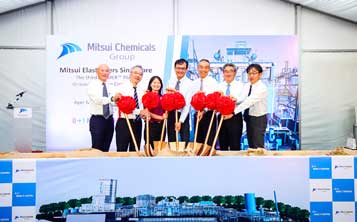Expansions: BASF to up capacity for polyisobutenes in Germany; Mitsui Chemicals breaks ground on expansion of elastomers plant in Singapore

German chemicals firm BASF will increase the production capacity for its medium-molecular weight polyisobutenes (PIBs), marketed under the tradename Oppanol B, at its site in Ludwigshafen, Germany, by 25%, in response to the rising global demand for applications including fuel and lubricant additives. The capacity expansion is expected to reach full completion by the first half of 2025.
“With this step we are further strengthening BASF’s position as a reliable supplier that strongly supports growth and the demanding requirements of customers in various industries,” says Lena Adam, Senior Vice President, Fuel and Lubricant Solutions, BASF SE.
Medium-molecular weight polyisobutenes are essential performance components for products in a variety of industries including the automotive, construction, electronics as well as the food & packaging industry. Applications, for example, may include surface protective films, window sealants, binder material for batteries and food packaging solutions.
“The additional production capacity for our medium-molecular weight Oppanol B polyisobutenes will enable our customers to grow with innovative solutions that contribute to sustainable development, for example, in energy-efficient housing. Building on our backward integration into key raw materials we will be leveraging the full strength of BASF as a global leader in polyisobutene,” explains Tanja Rost, Vice President, Global Marketing and Product Development, Fuel and Lubricant Solutions, BASF.

In other news, Japan’s Mitsui Chemicals has announced that it has held the groundbreaking ceremony for a new plant to produce the high-performance elastomer Tafmer at its Singapore-based wholly owned subsidiary Mitsui Elastomers Singapore Pte Ltd. The new plant will have a capacity of 120,000 tonnes/year and is scheduled for completion in 2024. The capacity of existing facility is 225,000 tonnes/year,
Tafmer is used both as a soft moulding material and as a resin modifier that improves resin properties. Its flexibility and lightness have resulted in it being used across a wide range of fields, including solar cell components, packaging materials, engineering plastic modifiers, sports shoes and automotive parts.
Demand for Tafmer is set to remain strong as the global economy grows, and is expected to rise further on the back of efforts to achieve a circular economy by stepping up the introduction of clean energy.
(IMA)Subscribe to Get the Latest Updates from IMA Please click here
©2023 Injection Moulding Asia. All rights reserved.













